Updated: January 2025 | Author: Dr. Khushbu Jain | Reviewed by: Dr. Deepak Gautam (Orthopedic surgeon)
Struggling with a sacral fracture can feel like an uphill battle, disrupting your daily life and causing persistent pain.
Sacral fractures, whether caused by trauma, a fall, or repetitive stress, not only bring severe discomfort but also hinder your mobility and independence. Without proper treatment, the condition can worsen, delaying recovery.
The good news? Advancements in sacral fracture treatment now offer effective solutions to help you regain your mobility, alleviate pain, and return to a more active lifestyle. With the right care and guidance, a full recovery is within reach.
What is a Sacral Fracture?
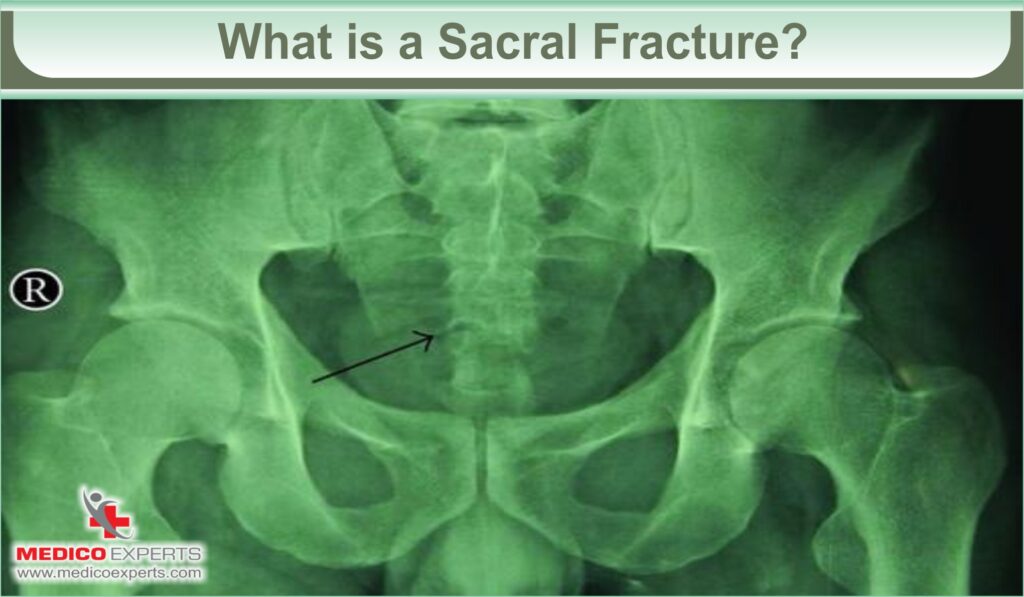
Before you understand a sacral fracture, you should know what a sacrum is.
A sacrum is a wedge-shaped bone at the back of your pelvis between your hip bones.
To make this bone, five vertebrae in your spine fuse. The sacrum and the hip bones together make the pelvis a sturdy ring and strong ligaments bind them together.
Fracture in the sacrum means, damage to the other bones in the pelvis and the ligaments.
What Are the Different Types of Sacral Fractures?
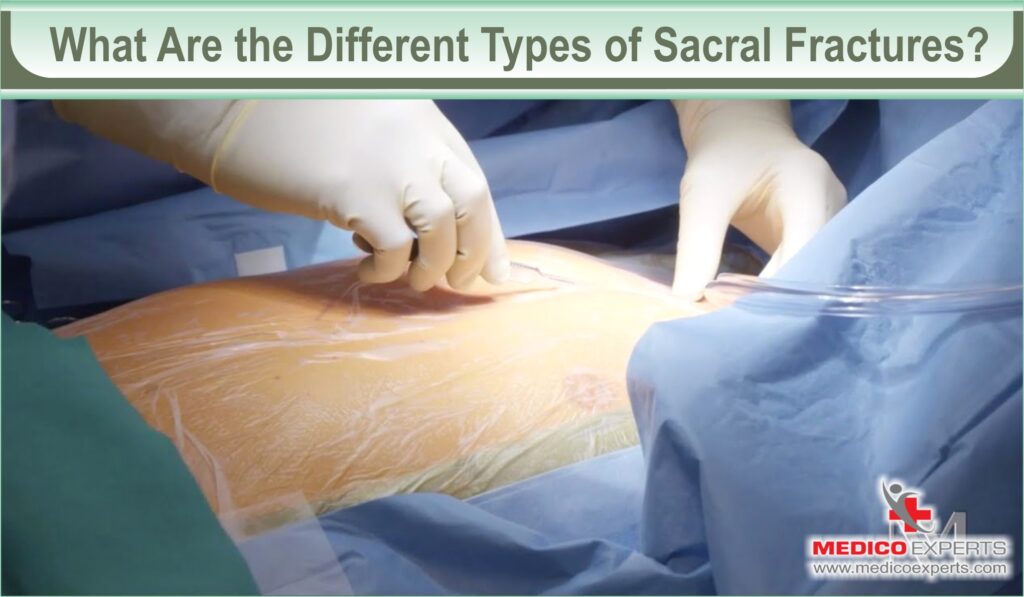
Sacral fractures are categorized into several types, each requiring different approaches for effective treatment:
1. Low-energy sacral fractures:
Elderly individuals or those with weakened bones can suffer from this fracture, often due to osteoporosis. Low-energy sacral fractures occur from minimal trauma.
2. High-energy sacral fractures:
High-energy sacral fractures happen due to trauma. The person may sustain an injury in a car accident or may have fallen from a height to get such a trauma.
3. Sacral stress fracture:
Runners who are doing too many activities without proper training are at risk of this fracture. It can also happen to a woman who has just delivered a baby and had some kind of bone loss during the pregnancy.
4. Sacral Avulsion Fracture:
Common in athletes, these fractures occur when a tendon or ligament pulls a fragment of bone away from the sacrum due to forceful muscle contractions.
5. Sacral Compression Fracture:
Result from traumatic events like falls or accidents, compressing or crushing the sacrum.
What are the symptoms of sacral fractures?
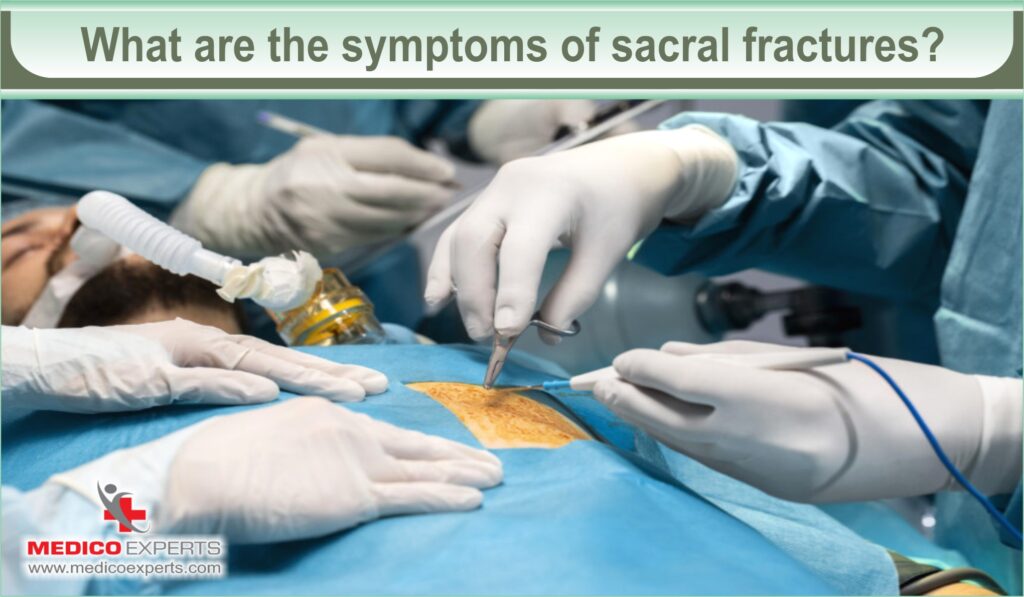
So what makes you think that you have a sacral fracture?
You need to understand the symptoms first and then consult a doctor. To help you out, here are some of the symptoms of sacral fracture:
- Severe lower back or buttocks pain
- Moving, especially standing up or sitting down, can make the pain worse.
- Walking might become a challenge as the pain can radiate down your legs.
- Your lower back or sacrum area might be tender to the touch.
- Numbness, tingling, or weakness in your legs or feet could be a red flag.
- In severe cases, sacral fractures can mess with your bowel or bladder control.
- Look out for bruising or swelling around the lower back
If you have any or a few of these symptoms, do not hesitate to consult your doctor.
How to Diagnose Sacral Fracture?
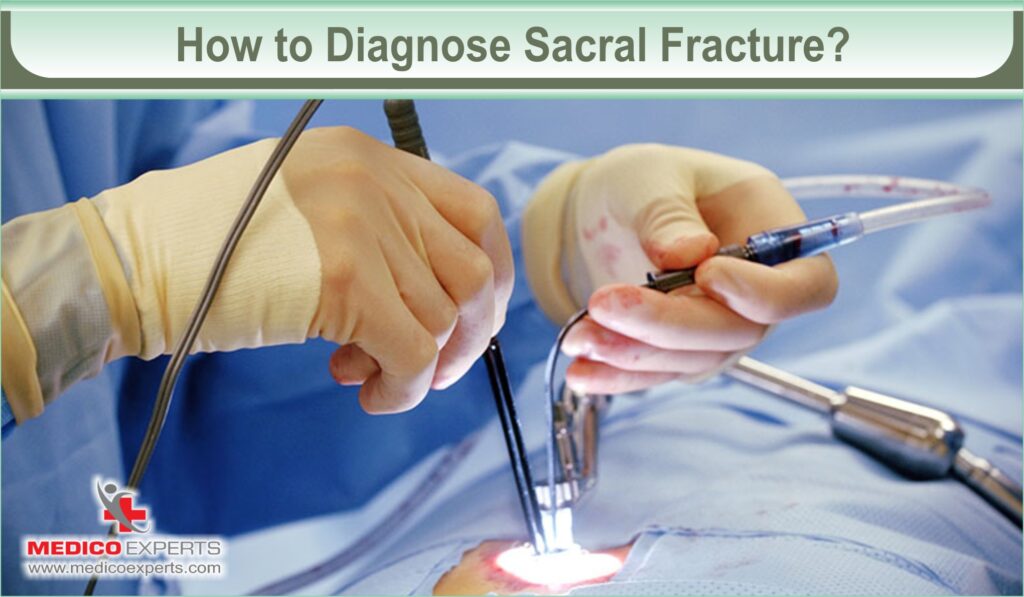
As said above, doctors often fail to diagnose sacral fractures. Either they are diagnosed late or they go undiagnosed. If you have back pain, there can be many causes behind it like muscle weakness or tightness, joint inflammation, etc.
To diagnose a sacral fracture, doctors need to take a few steps:
- Firstly, they rely on your history – did you have a fall, a sports injury, or perhaps a car accident?
- Then comes the physical examination, where tenderness or deformities around the sacrum might be clues.
- Next, X-rays are often the first step, capturing a snapshot of your sacrum.
- If there are still doubts, they may call in reinforcements like CT scans or MRI scans, which provide more detailed views of the bones and surrounding tissues.
All these steps help doctors form a complete picture and determine the type and severity of the sacral fracture, guiding them toward the best treatment plan.
Remember, when a sacral fracture goes untreated and undiagnosed, it can result in neurological symptoms and urinary, rectal, and sexual dysfunctions.
How is Sacral Fracture Treatment performed?
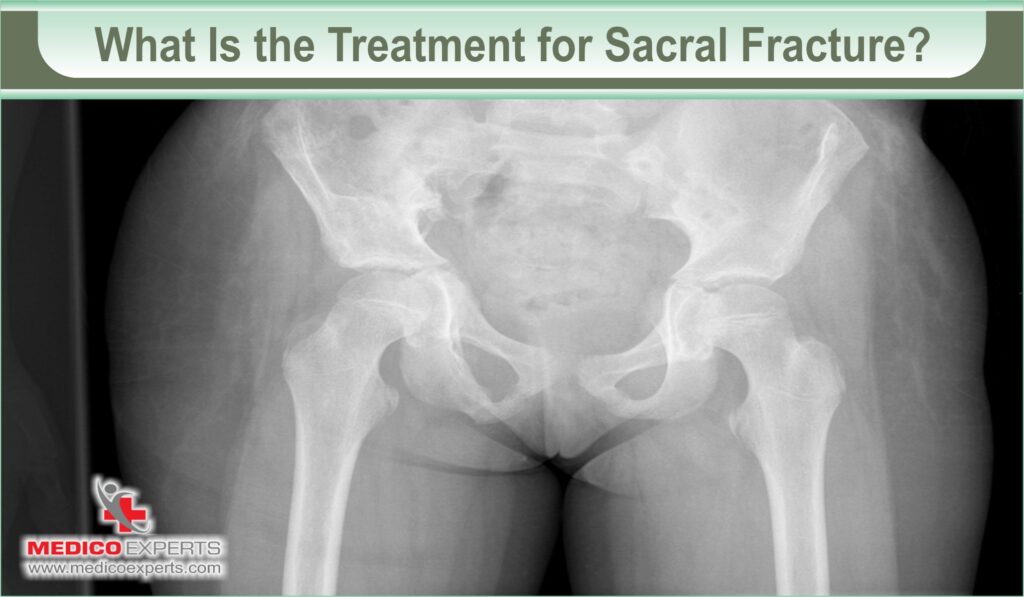
Here are some that you should remember when it comes to sacral fracture treatment:
Non-Surgical Treatments:
- Rest and Pain Management: Low-energy and stress fractures often require rest, pain relief medications, and controlled mobility.
- Calcium and Vitamin D Supplements: Essential for bone healing, especially in stress or low-energy fractures.
- Physical Therapy: Helps restore mobility and strength gradually during recovery.
Surgical Treatments:
- Surgical Stabilization: Severe fractures may need screws, plates, or bone cement to stabilize the sacrum.
- Nerve Decompression Surgery: Required if the cauda equina (nerves at the spinal cord’s end) is compressed.
Innovative Techniques:
- Minimally invasive procedures like sacroplasty are being explored for faster recovery and minimal scarring.
MedicoExperts has a panel of orthopedics specialists who can help you make an informed decision from the comfort of your home.
Sacral Fracture Healing Time
One of the most common concerns is, “How long does a sacrum fracture take to heal?”
- For minor fractures, recovery typically takes 8-12 weeks with proper care and rest.
- Severe fractures may extend healing time to 4-6 months, especially if surgery is involved.
Tips for a Faster Sacral Fracture Recovery
- Follow Your Doctor’s Advice: Rest as recommended, and avoid overexertion.
- Physical Therapy: Gradually resume activities to improve mobility and strength.
- Healthy Diet: Incorporate calcium-rich foods like dairy, leafy greens, and nuts to boost healing.
- Supportive Aids: Use braces or crutches to relieve pressure on the sacrum.
- Avoid Risky Activities: Avoid activities that could cause a fall or strain during recovery.
Final thoughts
Recovery from a sacral fracture depends on timely diagnosis, effective treatment, and adherence to post-treatment care. Sacrum fracture recovery time varies, but with advancements in sacral fracture treatment, most patients regain mobility and comfort within weeks or months.
At MedicoExperts, we connect you with some of the best orthopedic specialists in India. With over 10,000 satisfied patients globally, we ensure you receive expert care from the comfort of your home.
Get the Best Sacral Fracture Treatment Today!
At MedicoExperts, our specialists ensure personalized care for a faster recovery. Don’t let a sacral fracture from a fall or trauma hinder your life.
FAQ :
Q1. Can you walk with a sacral fracture?
Walking with a sacral fracture can be incredibly painful and challenging, especially if the fracture is severe or unstable. Attempting to walk may exacerbate the injury and lead to further complications. It’s generally advisable to seek medical attention promptly and follow the recommended treatment plan, which may include rest, bracing, or surgery, before attempting to walk again.
Q2. How long does it take for a fractured sacrum to heal?
The healing time of a sacral fracture can vary depending on the person’s other injuries. But usually, it takes 8-12 weeks to heal.
Q3. Can I exercise with a sacral fracture?
When it comes to your exercise routine, go slow. It takes some time to completely heal and during this period it will be uncomfortable for you to exercise. Even if you do not feel any pain while doing exercise or playing outside make sure you use the proper accessories and equipment recommended by your doctor.
Q4. What are the long-term effects of a sacral fracture?
If it goes untreated, you may have chronic back pain, spine deformity, and instability. So do not ignore any symptoms of sacral fracture and consult your healthcare provider immediately.
References
- https://www.ncbi.nlm.nih.gov/pmc/articles/PMC7265089/
- https://pubmed.ncbi.nlm.nih.gov/24981900/
- https://www.ncbi.nlm.nih.gov/pmc/articles/PMC3279068/
Medical Disclaimer: This content is for informational purposes only and is not a substitute for professional medical advice, diagnosis, or treatment. Always consult your doctor.



